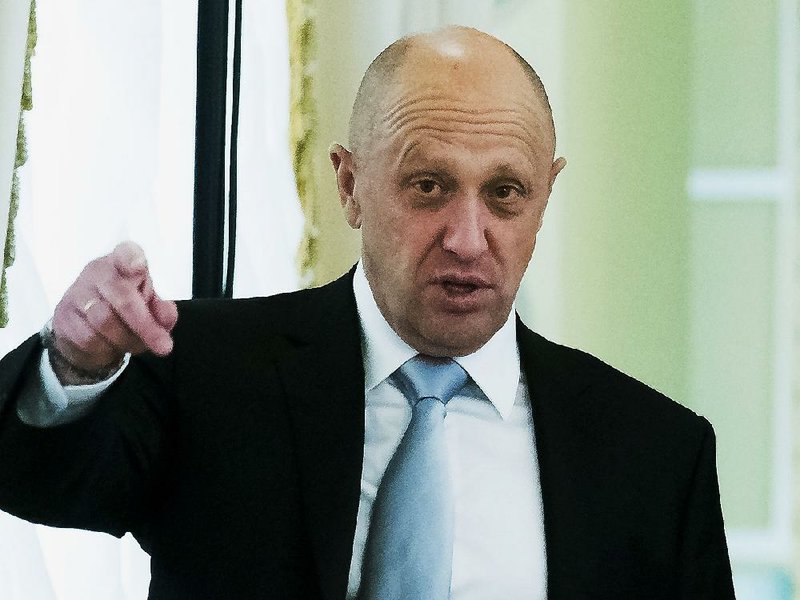The U.S. military blocked Internet access to an infamous Russian entity seeking to sow discord among Americans during the 2018 midterms, several U.S. officials said, a warning that the group's operations against the United States are not cost-free.
The strike on the Internet Research Agency in St. Petersburg, a company underwritten by an oligarch close to President Vladimir Putin, was part of the first offensive cyber campaign against Russia designed to thwart attempts to interfere with a U.S. election, the officials said.
"They basically took the IRA offline," according to one individual familiar with the matter who, like others, spoke on the condition of anonymity to discuss classified information. "They shut 'em down."
The operation marked the first muscle-flexing by U.S. Cyber Command, with intelligence from the National Security Agency, under new authorities it was granted by President Donald Trump and Congress last year to bolster offensive capabilities.
Whether the impact of the St. Petersburg action will be long-lasting remains to be seen. Russia's tactics are evolving, and some analysts were skeptical of the deterrent value on either the Russian troll factory or on Putin, who, according to U.S. intelligence officials, ordered an "influence" campaign in 2016 to undermine faith in U.S. democracy. U.S. officials have assessed that the Internet Research Agency works on behalf of the Kremlin.
"Such an operation would be more of a pinprick that is more annoying than deterring in the long run," said Thomas Rid, a strategic studies professor at Johns Hopkins University, who was not briefed on the details.
But some U.S. officials argued that "grand strategic deterrence" is not always the goal. "Part of our objective is to throw a little curve ball, inject a little friction, sow confusion," said one defense official. "There's value in that. We showed what's in the realm of the possible. It's not the old way of doing business anymore."
The action has been hailed as a success by Pentagon officials, and some U.S. senators credited Cyber Command with averting Russian interference in the midterms.
"The fact that the 2018 election process moved forward without successful Russian intervention was not a coincidence," said Sen. Mike Rounds, R-S.D., who did not discuss the specific details of the operation targeting the St. Petersburg group. Without Cyber Command's efforts, there "would have been some very serious cyber incursions."
The disruption to the Internet Research Agency's networks took place as Americans went to the polls and a day or so afterward -- as the votes were tallied, to prevent the Russians from mounting a disinformation campaign that casts doubt on the results, according to officials.
The Internet Research Agency as early as 2014 and continuing through the 2016 presidential election sought to undermine the U.S. political system, according to the Justice Department. Posing as Americans and operating social media pages and groups, Russian trolls sought to exacerbate tensions over issues such as race, sexual identity and guns.
The agency, according to federal prosecutors, is financed by Yevgeniy Prigozhin, a tycoon from St. Petersburg and an ally of Putin. Prigozhin, the Internet Research Agency and a company Prigozhin runs called Concord Management and Consulting, were among 16 Russian individuals and companies that a grand jury indicted a year ago as part of special counsel Robert Mueller's investigation into Russian interference in the 2016 election.
Prigozhin said in a statement on the Russian version of Facebook, "I cannot comment on the work of the Internet Research Agency in any way because I have no relation to it." Concord Management declined to comment, citing the ongoing litigation in the United States.
Another element of the Cyber Command campaign, first reported by The New York Times, involved "direct messaging" that targeted the trolls and as well as hackers who work for the Russian military intelligence agency, the GRU. Using emails, pop-ups, text or direct messages, U.S. operatives beginning last October let the Russians know that their real names and online handles were known and they should not interfere in other nations' affairs, defense officials said.
Some Internet Research Agency officials were so perturbed by the messaging that they launched an internal investigation to root out what they thought were insiders leaking personnel information, according to two individuals.
The operation was part of a broader government effort to safeguard the 2018 elections, involving the departments of Homeland Security, State and Justice, as well as the FBI. It was led by Gen. Paul Nakasone, who in July formed the Russia Small Group, made up of 75 to 80 personnel from Cyber Command and NSA, which are part of the Defense Department.
Information for this article was contributed by Joseph Marks of The Washington Post.
A Section on 02/27/2019
